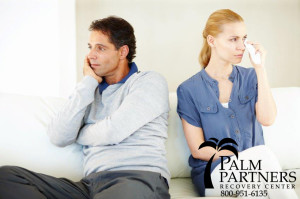So you get sober, but now you still are dealing with the struggles of addiction because you have a family member actively using. It can be a lot to deal with. I’ve thought of 7 things no one tells you about having a family member in active addiction.
7 Things No One Tells You about Having a Family Member in Active Addiction…
1. It can be hard to keep your relationship and your recovery separate
When you have a family member in sobriety with you it can be hard to keep your relationship and your recovery separate. It becomes a struggle to not talk about things in ‘recovery lingo’ with them and just treat each other like siblings, or parents, or children or etc. I found it very helpful to remember that no matter what, we are family first and the fact that we are both addicts/alcoholics is just something we have in common.
2. You become an enabler
Whether you want to or not, you end up enabling them. I know for me, when my family member has been getting high it is near impossible for me to not help them in some way. Letting them stay on your couch, lending them money or just giving them rides. It is one of the toughest things to try to turn your back on a family member, even if it’s what is best for them.
3. You get angry with them
Keeping the relationship resentment-free isn’t likely. You may find yourself getting angry at the family member for numerous reasons. You may end up fighting with them over things that you normally wouldn’t just because you are upset and resentful that they are using. Talk with your sponsor and supports and reach out to others for help with this. You don’t want to go through this alone.
4. It’s different seeing things from the other side of the spectrum
It’s crazy being sober and seeing someone in active addiction with their insane behaviors. Seeing the disease of addiction and watching how sick someone can be, especially a family member, can be heartbreaking. Remind yourself that you were once there and be grateful you are in a better place now. All you can do is pray for your family member and be there if they need help.
5. You end up apologizing for them and their behavior
Apologizing for a family member’s bad behavior isn’t your responsibility, but I understand it. I know that I personally have apologized for my family members actions over and over again. Even though it has nothing to do with us, we somehow end up feeling responsible. Keep in mind that this isn’t something you need to be apologizing for. This is THEIR actions and THEIR behaviors and not a reflection on you.
6. It can be super difficult to not get all involved in their program and sobriety
As much as you want them to be sober and working a program, it’s not up to you to do this for them. Stay out of their sobriety, or lack thereof. Just like you, they will get sober when they are ready and willing to get help. We can’t get anyone sober or high. If they went to try to get sober, great! If not, leave them be and just be ready to help when they need it. You can’t help someone who doesn’t want to be helped.
7. Keeping your program first and setting those boundaries is challenging
If you aren’t keeping your program and your recovery first, you will never be able to be a support for your family member. If you keep your program first, everything else will fall into place. It is vital to your recovery to set boundaries with a family member who is in active addiction. Seek support and help from your friends and sponsor.
If you or a loved one are struggling with substance abuse or addiction, please call toll free 1-800-951-6135.
